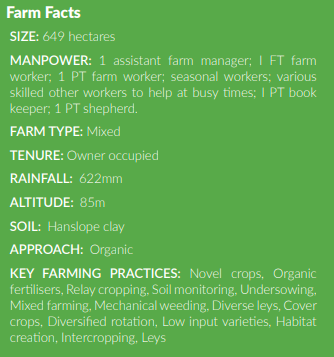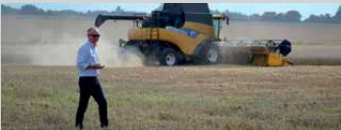Farmer – Shimpling Park Farm


The Farm
Our crops are all grown for specific markets. We grow organic wheat, barley and beans for British Quality Pigs’s organic herd, which are sold in Waitrose under the Duchy Original brand. Organic oats are produced for White Oats, organic spelt for Sharpham Park and organic quinoa for the British Quinoa Company. We never put a crop in the ground without securing a market for it. We also have 500 New Zealand Romney sheep which graze our two year grass and clover leys which are either sold locally or through the Organic Livestock Marketing Co-Operative. We also mill some of our own flour which is sold to local bakers.
We are in a Countryside Stewardship Scheme which runs until 2023 with the main focus being on landscape restoration, farmland birds and education. So far we have restored various farm ponds as well as two medieval moated sites, replanted hedges which had been formerly removed, coppiced ancient woodland and restored some of the medieval wood pasture in Shimpling Park. We do in excess of 25 school visits very year and well as evening walks for various interest groups.

Every year we plant 40 hectares of pollen and nectar mixes for pollinators and 10 hectares of wild bird seed mixtures.
We conduct regular bird surveys with the last survey concluding, “The 17 year history of organic management at Shimpling Park appears to favour and encourage a stronger farmland bird community or at the very least may have prevented the declines experienced in areas dominated by intensive management”. The reversal of our declining arable bird species on the farm is something that we are particularly proud of.
We have a photovoltaic array on our grain store roof which offsets the electricity used by our electric grain drying fans. We also have two woodchip boilers which are fed entirely from the wood coppice from our ancient woodland which is in the middle of the farm. We also rent out a number of buildings to local businesses on a former USAF airfield at Lavenham.
Sustainability In Practice:
Over the last 2 years we have developed a Controlled Traffic Farming (CTF) system on our fields with the aim of reducing tractor wheelings and therefore compaction on our soils. My inspiration came from Tim Chamen from CTF Europe Ltd. More can be found out about CTF on their website.
Essentially CTF means tractors run on the same track every time they enter a field treating the untracked part of the field like a bed never to be run on. This has obvious consequences of less compaction, better plant root development and optimum yield. For us it is early days, but already we are seeing the benefits of more even crop growth, consistent and deeper rooting structures, better water infiltration and more earth worms.
The main challenge was coming up with the track width which would be future proof. In the end we decided on an 8.8m system and at the time of writing all our field implements fit into that track width apart from our combine harvester but hopefully that will be concluded by harvest 2017.
Motivations:
My family have been farmers in Suffolk for four generations and before that in Ayrshire and so there was considerable pressure on me to take on the family business!
I came to the farm in 1985 and it was typical example of post-WW2 agriculture. Many of the hedgerows had been removed to make the fields easier to farm with larger machinery as well as making way for an American bomber base. Cropping revolved around wheat, oil seed rape and sugar beet and was stockless with the dairy herd going in the 1960’s and pigs going in the 1970’s. In the mid 1990’s I began to notice some of our better soils yielding less and some of them slumping. I also became increasingly concerned about the amount of chemicals we were using and I began to worry about their long term impact on my soils and wildlife.
A near neighbour of mine was farming organically and I spent some time with him working how a stockless organic rotation could run on our farm. In 1999 I converted 120 hectares and ran a six year rotation comprising of a 2 year ley followed by winter wheat, triticale, winter beans and then spring barley under sown with another ley. Not only did the rotation do slightly better financially than the rest of the farm I also found it to be a much more creative way to farm as well as a release from a high input system with costs I could increasingly not control. In 2007 we converted the rest of the farm to organic production as well as other local farms we were farming for neighbours under contract farming arrangements. Our organic contract farming operation has expanded by 30% over the last 18 months with us now farming a further 650 hectares for local farmers all within a 7 mile radius of our own farm.
Although farming a stockless arable rotation has been very successful my heart told me that we should reintroduce livestock to try and close the nutrient gap which we had been filling by importing manures and green waste. In 2014 we bought 250 New Zealand Romney ewe lambs with a further 250 following them in 2015. We have now closed the flock and intend to build it to 1,000 breeding ewes which will then be able to make best use of our 2 year leys. The flock all lamb outside and are pasture fed apart from the occasional winter supplement of haylage and oats all of which are grown on the farm.
My aims are to leave the farm’s soil in a better condition than I received it, increase biodiversity and make a profit!
When I converted the farm to organic production in 1999 I did a soil organic matter (SOM) test pre-conversion which gave us a 2.9% SOM result. This year we had tests averaging 5.5% SOM.
Visit www.agricology.co.uk to view other blogs, videos, podcasts, research projects and resources on growing and managing cover crops. Agricology is an independent collaboration of over 20 of the UKs leading farming organisations and provides a platform for farmers and researchers to share knowledge and experience on agroecological farming practices; online and in the field.
Subscribe to the newsletter or follow on social media @ agricology to share your questions and experiences with the Agricology community.
